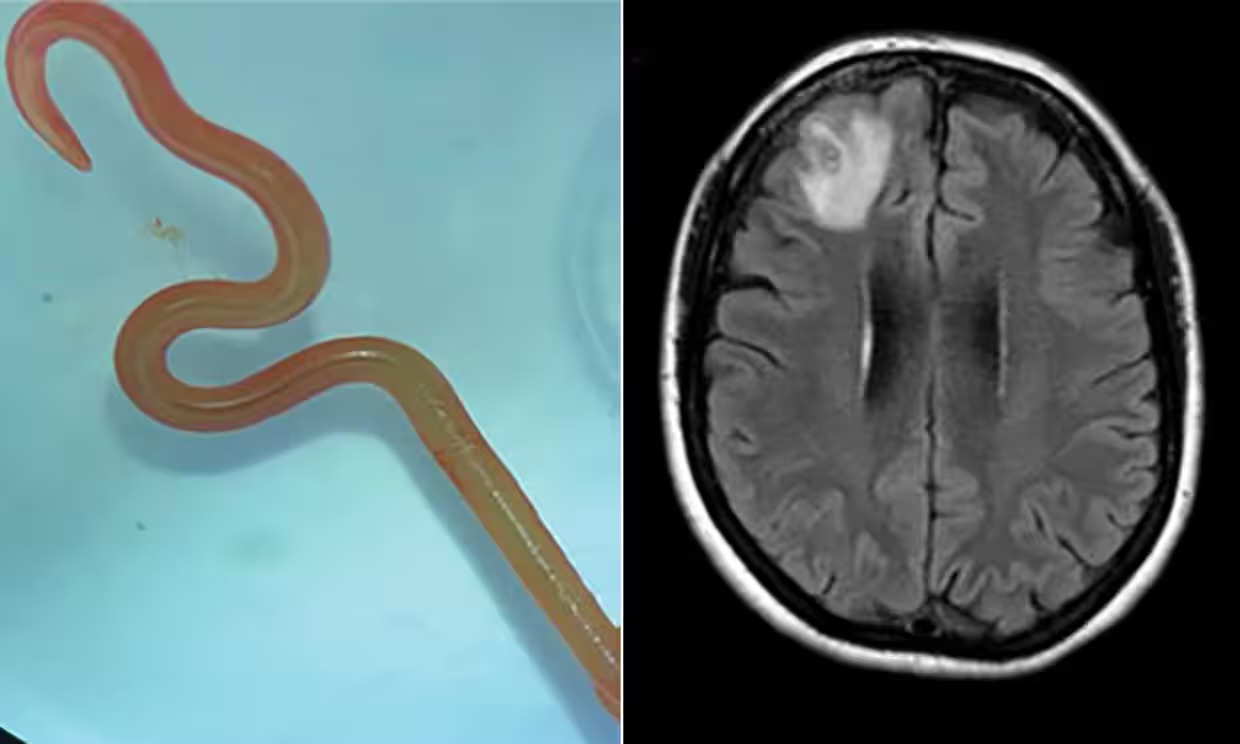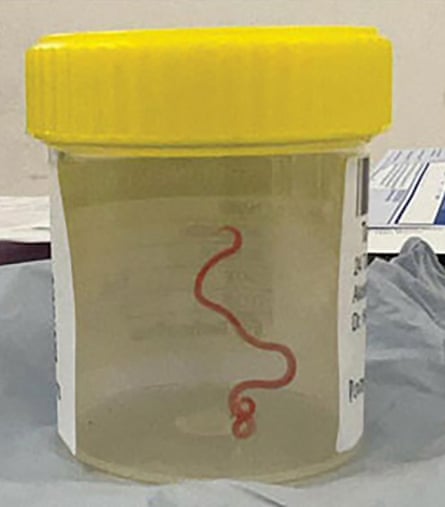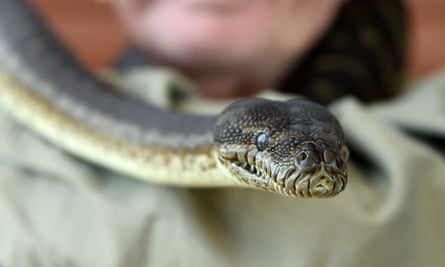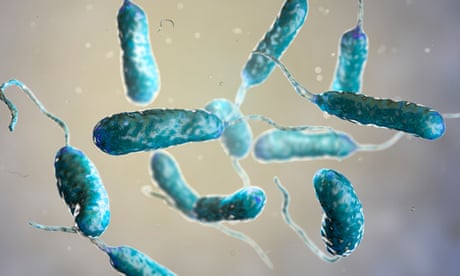Woman complained of forgetfulness and depression before doctors pulled out an 8cm roundworm normally found in pythons.
 The Ophidascaris robertsi larvae specimen that was extracted alive from the woman’s brain by surgeons at Canberra hospital. Composite: Canberra Health
The Ophidascaris robertsi larvae specimen that was extracted alive from the woman’s brain by surgeons at Canberra hospital. Composite: Canberra Health
–

–
It was a fairly regular day on the ward for Canberra hospital infectious diseases physician Dr Sanjaya Senanayake, until a neurosurgeon colleague called him and said: “Oh my god, you wouldn’t believe what I just found in this lady’s brain – and it’s alive and wriggling.”
The neurosurgeon, Dr Hari Priya Bandi, had pulled an 8cm-long parasitic roundworm from her patient, prompting her to call on Senanayake and other hospital colleagues for advice about what to do next.
The patient, a 64-year-old woman from south-eastern New South Wales, was first admitted to her local hospital in late January 2021 after suffering three weeks of abdominal pain and diarrhea, followed by a constant dry cough, fever and night sweats.
By 2022, her symptoms also included forgetfulness and depression, prompting a referral to Canberra hospital. An MRI scan of her brain revealed abnormalities requiring surgery.
–
“But the neurosurgeon certainly didn’t go in there thinking they would find a wriggling worm,” Senanayake said. “Neurosurgeons regularly deal with infections in the brain, but this was a once-in-a-career finding. No one was expecting to find that.”
The surprising discovery prompted a team at the hospital to quickly come together to uncover what kind of roundworm it was and, most importantly, decide on any further treatment the patient might require.
“We just went for the textbooks, looking up all the different types of roundworm that could cause neurological invasion and disease,” Senanayake said. Their search was fruitless and they looked to outside experts for help.
“Canberra is a small place, so we sent the worm, which was still alive, straight to the laboratory of a CSIRO scientist who is very experienced with parasites,” Senanayake said. “He just looked at it and said, ‘Oh my goodness, this is Ophidascaris robertsi’.”
Ophidascaris robertsi is a roundworm usually found in pythons. The Canberra hospital patient marks the world-first case of the parasite being found in humans.
The patient resides near a lake area inhabited by carpet pythons. Despite no direct snake contact, she often collected native grasses, including warrigal greens, from around the lake to use in cooking, Senanayake said.
The doctors and scientists involved in her case hypothesize that a python may have shed the parasite via its feces into the grass. They believe the patient was probably infected with the parasite from touching the native grass and transferring the eggs to food or kitchen utensils, or after eating the greens.
Senanayake, who is also an infectious diseases expert based at the Australian National University, said the patient needed to be treated for other larvae that might have invaded other parts of her body, such as the liver. But given no patient had ever been treated for the parasite before, care was taken. Some medications for example could trigger inflammation as the larvae died off. Inflammation can be harmful to organs such as the brain, so they also needed to administer medications to counteract any dangerous side-effects.
–
“That poor patient, she was so courageous and wonderful,” Senanayake said. “You don’t want to be the first patient in the world with a roundworm found in pythons and we really take our hats off to her. She’s been wonderful.”
The patient is recovering well and is still being regularly monitored, Senanayake said, and researchers are exploring whether a pre-existing medical condition that caused her to be immunocompromised could have led to the larvae taking hold. The case has been documented in the September edition of the journal Emerging Infectious Diseases.
According to the US Centers for Disease Control and Prevention, three-quarters of new or emerging infectious diseases in people come from animals.
Senanayake said the world-first case highlighted the danger of diseases and infections passing from animals to humans, especially as people and animals start to live more closely together and habitats overlap more.
“There have been about 30 new infections in the world in the last 30 years,” he said.
“Of the emerging infections globally, about 75% are zoonotic, meaning there has been transmission from the animal world to the human world. This includes coronaviruses.
“This Ophidascaris infection does not transmit between people, so this patient’s case won’t cause a pandemic like Covid-19 or Ebola. However, the snake and parasite are found in other parts of the world, so it is likely that other cases will be recognized in coming years in other countries.”
Infectious diseases physician Prof Peter Collignon, who was not involved in the patient’s case, said some cases of zoonotic diseases may never be diagnosed if they are rare and physicians don’t know what to look for.
“Sometimes, people die with the cause never being found,” he said.
“It’s worth taking care when encountering animals and the environment, by washing foods thoroughly and cooking food properly, and wearing protection like long sleeves so you don’t get bitten,” he said.
–
From Elon Musk to Rupert Murdoch, a small number of billionaire owners have a powerful hold on so much of the information that reaches the public about what’s happening in the world. The Guardian is different. We have no billionaire owner or shareholders to consider. Our journalism is produced to serve the public interest – not profit motives.
And we avoid the trap that befalls much US media – the tendency, born of a desire to please all sides, to engage in false equivalence in the name of neutrality. While fairness guides everything we do, we know there is a right and a wrong position in the fight against racism and for reproductive justice. When we report on issues like the climate crisis, we’re not afraid to name who is responsible. And as a global news organization, we’re able to provide a fresh, outsider perspective on US politics – one so often missing from the insular American media bubble.
Around the world, readers can access the Guardian’s paywall-free journalism because of our unique reader-supported model. That’s because of people like you. Our readers keep us independent, beholden to no outside influence and accessible to everyone – whether they can afford to pay for news, or not.
If you can, please consider supporting us just once from $1, or better yet, support us every month with a little more. Thank you.
Betsy Reed
Editor, Guardian US

Topics
- –
- –
- –
- –
















